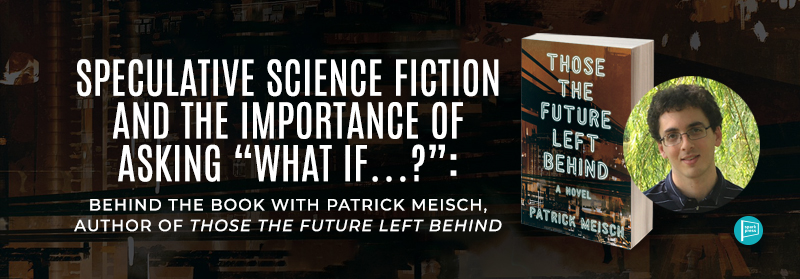
When I finally sat down and started to put fingers to keys, banging out my debut novel, Those the Future Left Behind, I did so to alleviate a nagging frustration that had been growing within me. I was sick of consuming, consuming, consuming, and I was anxious to produce something that might affect change. When I finished, I realized that what I had created was a cautionary tale to serve as a desperate plea to join me in doing more to impact not only our present society and environment, but those that are to come as well. Sentiments like this are often the crux of the wondrous subgenre known as Speculative Science Fiction.
1984, Dune, The Handmaid’s Tale. All of these are phenomenal works of speculative science fiction that continue to inspire people with the message: “We are not satisfied with the present-day societal status-quo and we are worried about extrapolations of today affecting what’s to come.” Questions then arise from this notion that beg an answer from readers: “Have we gone too far?” “Will we go even further?” “Could we do better?” “Are we doomed already?”
Writing tantalizing speculative sci-fi is all about inviting readers to experience extrapolations of present-day issues. All good speculative sci-fi stems from a writer’s dissatisfaction with the societal status-quo, thus writing about this dissatisfaction to compel others to take a stand on the issues you are examining. The most phenomenal aspect of writing in this genre is that the incredible stories you find under its umbrella classification are derived from experiencing some of the most mundane events of your life, and then asking “what if…?” repeatedly and seeing where that takes you.
For me, the process began with seeing a kid dump something clearly compostable into a trash receptacle that was three inches away from a compost receptacle—despite there being an image of the trashed item attached to the entire waste station for sorting clarity. What if… in the future there was widespread use of a technology in the sanitation business that could atomize all forms of matter and efficiently repackage them into harmless compounds? What if… that was applied to nuclear waste? Enter the concept of waste transmutation compounds applied to nuclear waste mitigation to provide a quick, less-than-a-sentence inclusion that catapults readers further into the high-tech, city-scape backdrop of the near-future, while being grounded in a realistic limitation to the nuclear energy waste processes of today.
Then I answered some questions regarding Earth’s theoretically realistic carrying-capacity for humans, and its relation to resource scarcity after lecturing to some high school students about ecology for an hour. What if… various governments of the world started introducing elective lifestyle options that might cause the overall population of humans to taper off, or even begin to dwindle to ecologically-stable levels? What if… these eventually caught fire and began to be demanded world-wide? What if… some people tried to game the system? Enter, essentially, the core concept of Those the Future Left Behind.
Despite being a science teacher, I worry that I could have made different choices throughout my life when I was younger in order to contribute more towards the direct improvement of the social and environmental issues currently affecting governments and the Earth. But I also feel that maybe I wasn’t educated on these issues as much as I could have been today, back in grade school fantasizing about my ideal choice of career. What if… we fast-forward to a future where we haven’t made all the changes that we are thinking about possibly undertaking today, and look at what has unraveled as a result through the eyes of someone feeling equally as uncertain as I do in those brief moments. Enter the Collector, the protagonist or antagonist of my story who may be regarded as a hero, a nonfactor, or a sociopath, depending on your point of view at the time of reading.
What is particularly remarkable about this process—and what I wish to convey to you above all else—is that, while writing and publishing a book may seem special at first, the beginnings of this process can worm their way into your heads from the most humble beginnings.
It is often through reading and discussing literature that at first seems fanciful that we are inspired to look critically on our own practices, and possibly build enough of a consensus on what we could be doing better in the real world to meet some of the lofty ideals presented therein to affect real change.
Maybe your “what if…?” will spark the next big conversation.

Leave A Comment